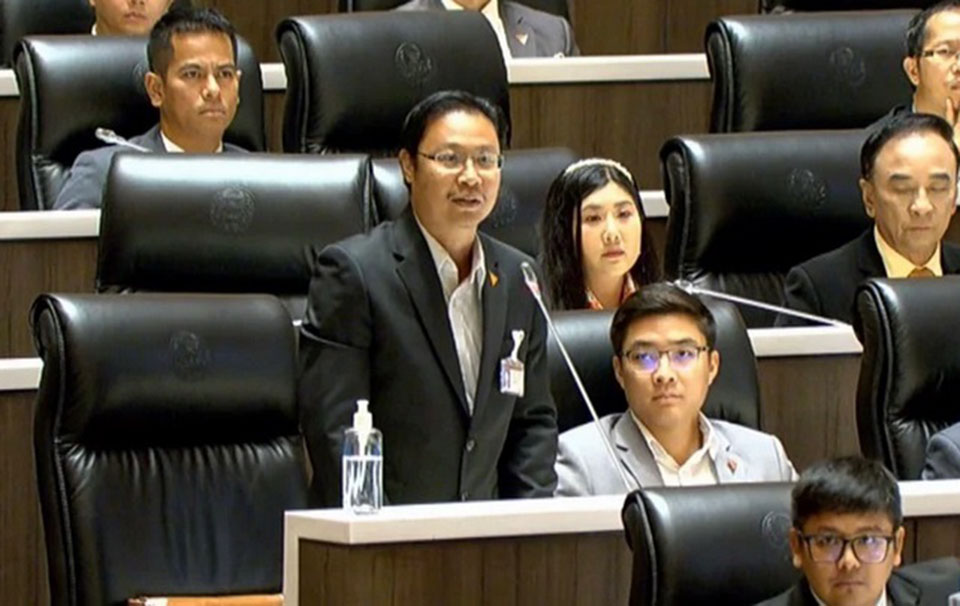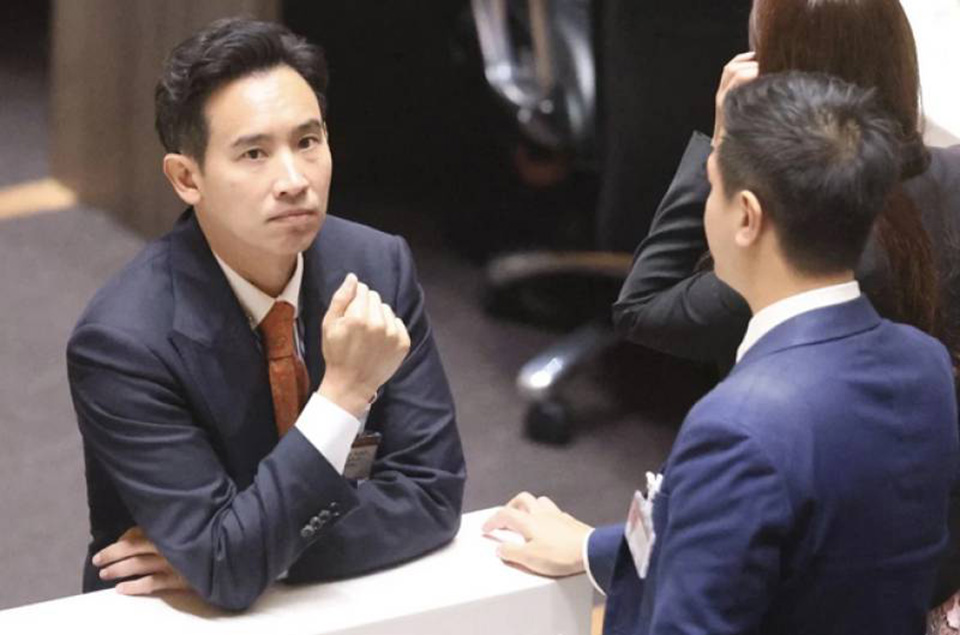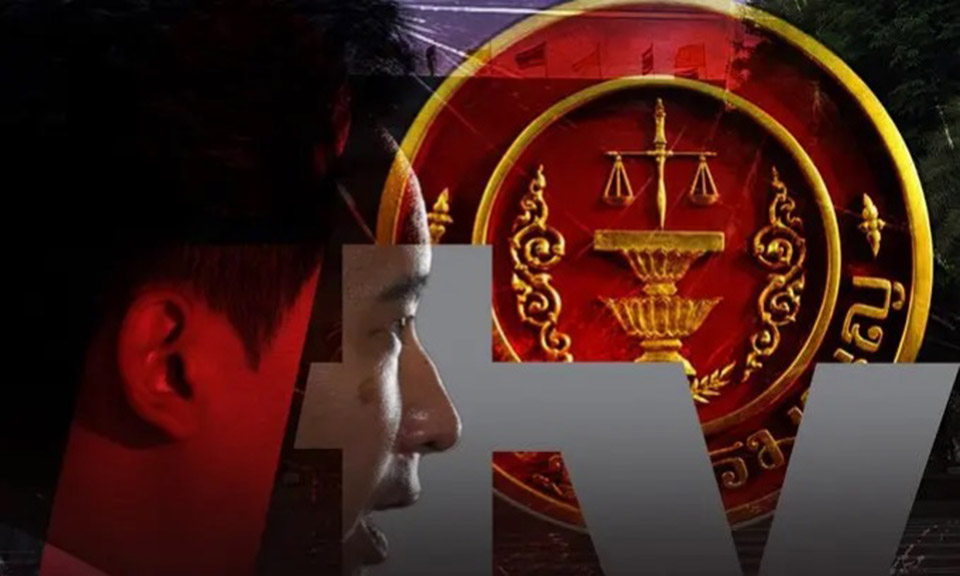Fears that the petition accepted by the Constitutional Court last Wednesday relating to Article 112 of the Criminal Code and Section 49 of the 2017 Constitution could see the Move Forward Party dissolved. Thai politics is suspended as long as this case is left undecided and if the petition is upheld, the current political equation may be shattered overnight if the Move Forward Party is dissolved and its leadership banned from politics. It's the elephant in the room threatening to unleash more turmoil.
On Monday, a group of Thai senators announced that they would oppose the renomination of Mr Pita Limjaroenrat to parliament as Prime Minister on Wednesday. The move comes as concerns also grow about the potential intervention of the Constitutional Court on the same day. The court has a petition before it which could ultimately see the Move Forward Party dissolved. The week is expected to see significant development in the political arena with all the signs pointing towards a plot by conservative elements to derail the radical democratic agenda of the Move Forward Party ushered in by the May 14th General Election result and install a government which includes elements of the outgoing regime as a safer, more mature alternative for the next four years, a long time in Thai politics.
Thailand has entered a second week of an emerging power play between democratic forces and more conservative elements within the political firmament which are intent not only on blocking Mr Pita Limjaroenrat from becoming Prime Minister but bringing about a government involving some of the political parties linked with the outgoing cabinet.
It is a struggle that became more apparent on Thursday when the nomination of Mr Pita Limjaroenrat was defeated in a joint sitting of Parliament with strong opposition to the Move Forward Party emerging from more conservative parties in the House of Representatives and influential senators in the upper house.
Petition accepted by the Constitutional Court under Article 49 of the 2017 Constitution saying Move Forward Party seeks to undermine the state
As the eight-party coalition including the Move Forward and Pheu Thai parties, met on Monday to discuss tactics, as it prepares to re-nominate Mr Pita on Wednesday, the politicians involved find themselves operating in an environment that is highly uncertain because of the possibility of a dramatic intervention on Wednesday by Thailand's Constitutional Court.
The court, last Wednesday, took up two petitions, one concerning Mr Pita and his eligibility for public office because of shares in the defunct media company iTV, and the other, perhaps more significant petition, one taken directly from a member of the public, lawyer Theerayut Suwankesorn, a complaint pertaining to Section 49 of the Constitution.
It argues, simply, that the more radical party's attempts to amend Article 112 of the Criminal Code dealing with lèse-majesté could be construed as an attempt to overthrow the constitutional monarchy.
A judgement upholding the petition could be a shattering blow to the present coalition and political equation with the Move Forward Party dissolved
Any decision by the Constitutional Court to affirm or uphold this petition could have immediate and far-reaching implications for politics in Thailand as it conceivably could lead to the disbanding of the Move Forward Party either this week or at some point in the immediate future.
The dissolution of political parties does not happen in nearly all healthy democratic countries. However, it is the law and is nothing new in Thailand.
It occurs regularly in the kingdom but there have been several significant occasions in recent history such as in December 2008 when the Constitutional Court dissolved the ruling People's Power Party ushering in the Democrat-led government of Abhisit Vejjajiva on December 2nd 2008.
Curiously, the defence minister in that new government was General Prawit Wongsuwan, the current Deputy Prime Minister and leader of the Palang Pracharat Party, who is reported to have quite a powerful influence over members of the current Senate.
People's Power Party was dissolved in 2008 after winning the election decisively a year earlier in 2007 leaving power to the rump of that parliament
The People's Power Party was dissolved by the Constitutional Court over allegations of electoral fraud in association with other parties in the December 2007 General Election in which it won power by winning 233 seats out of 480 in parliament.
Another significant dissolution of a political party occurred in February 2020 when the Constitutional Court dissolved the Future Forward Party which had come third in the March 2019 General Election.
Thailand is facing a deep political crisis as Pita loses key vote and top court takes up complaints
Future Forward Party dissolved – leadership banned from politics by Constitutional Court order
That party was dissolved after it was found it received ฿191.3 million in illegal campaign support linked with its leader Mr Thanathorn Juangroongruangkit who was also barred from politics for 10 years along with other key members of Future Forward who went on to form the Progressive Movement which is seen as a guiding force for the current Move Forward Party and its efforts to form a new government on what is seen in Thai politics as more radical lines.
Open and fiery debate on Article 112 in parliament last Thursday shocked many analysts and observers as such matters were not openly discussed before
One of the key changes that emerged in Thursday's fiery debate in parliament was the open and free exchange of views, although quite abrasive at times, that occurred related to Article 112 of the Criminal Code on lèse-majesté, a subject that was up to recently not aired or discussed in such a robust manner by politicians at all.
The debate saw Move Forward call for wider reform of Thailand's defamation laws which now allow people to be charged both under civil and criminal legal provisions.
The determination shown by the Move Forward Party to pursue its policy platform in which it has promised to reform Article 112 has surprised and also disturbed many within its political alliance who are more at home or comfortable with the more accepted view in political circles that amending the law should not be either discussed or proceeded with.
It is notable that in the programme for government agreed among the eight-party coalition behind Mr Pita, the proposed new government has not committed itself to making any change to Article 112.
Article 112 divides the coalition and has been used effectively by conservatives to isolate Move Forward in politics and parliament since the election result
It is an issue that has created division not only in Parliament but also between the Move Forward Party and its coalition partners, one that is being exploited by conservative elements and which may be used as justification for political compromises which may have to be made if the Move Forward Party is shortly taken out of Thai politics or the political equation.
It is something that has only been addressed obliquely to politicians this week but is, in fact, the elephant in the room as the end round of battle is joined between the old and new Thailand in the political arena.
Such a development would be not just a bombshell in the current political environment but an earthquake.
But, as we have seen in 2008 and 2020, this can happen in the kingdom with its minefield of electoral and constitutional provisions and courts armed with strong precedents for intervention.
2008 dissolution of People's Power Party led directly to the violent and deadly Bangkok street protest in 2010 in which over 85 people were killed
The 2008 dissolution of the People's Power Party in December that year led to the collapse of the government of Prime Minister Somchai Wongsawat, the brother-in-law of former Thai Rak Thai Party Prime Minister Thaksin Shinawatra and Pheu Thai Party Prime Minister Yingluck Shinawatra.
This court decision subsequently led to violent street protests in Thailand culminating in very serious disturbances in Bangkok in 2010 which were suppressed in a government-ordered crackdown by the Royal Thai Army after law and order was threatened in the capital.
This turned out to be one of the most dangerous moments in recent Thai political history and the ongoing political conflict that has arisen in the kingdom since 2005.
In that crackdown, in mid-April and from the 13th to the 19th of May 2010, over 85 people were killed including some members of the security forces and two foreigners.
The dangerous situation flared from protests which occupied part of the capital headed by the United Front for Democracy against Dictatorship (UDD), calling for the removal of the Democrat Party-led government of Prime Minister Abhisit Veshava.
This government arose in the immediate aftermath of the disbandment of the People's Power Party and from the rump of MPs in parliament left in its wake.
Senator Somchai Sawangkarn bristles at online criticism and warns of criminal action against offenders. He will oppose a second nomination of Pita
On Monday, in Bangkok, Senator Somchai Sawangkarn, Chairman of the Senate Standing Committee on Human Rights, Rights and Liberties and Consumer Protection, who emerged last Thursday as a key voice in the Upper House against Mr Pita as Prime Minister, and who has threatened this week to take legal action against online critics who he says have targeted him and his family, came forward to question whether Mr Pita Limjaroenrat can be nominated again on Wednesday because of parliamentary regulations.
He referred to Regulation number 41 which prohibits a motion being debated for a second time in the same session of Parliament. Sources within Pheu Thai and other parties counter that the rule does not apply to nominations to particular roles but to bills and laws.
On Monday, Senator Somchai continued to express frustration at online commentary from the public and what he has termed threats against him and his family.
He warned that he and other senators would fight such activity with both civil proceedings and criminal prosecutions except for minor comments or those within the bounds of civil discourse.
Senator Somchai said that those hiding behind anonymity online can be tracked down by what he referred to as state tools taken to mean surveillance used by Thailand's security services in monitoring online social media commentary.
Taking the matter up with Parliament President
The Senator said he would discuss the matter on Tuesday with the Speaker of the National Assembly and Parliament President, Mr Wan Muhamad Noor Matha, who he understood, was consulting with whips in the Senate and the House of Representatives before the joint parliamentary session.
'If on July 19 Mr Pita is re-nominated for the post, there will certainly be a debate as to whether this can be done, for fear that it may be against the law. If Mr Pita is endorsed, a petition over the legality of his appointment will be made,' Senator Somchai told reporters. 'In my opinion, the first nomination for Mr Pita to be Prime Minister has been rejected. Only the nomination of a new candidate can be considered a new motion.'
Senator Somchai was supported by other senators, in voicing his concern on this matter, including Senator Seree Suwanpanont as they were interviewed by reporters.
Senator Kittisak Rattanawaraha also said he agreed but used the occasion to plead with the Move Forward Party to stand down from its position concerning Article 112 of the Criminal Code on lèse-majesté.
Pita and Move Forward Party ready to give way on Thursday to a Pheu Thai nominee widely predicted to be Mr Srettha Thavisin, the former property mogul
Mr Pita, on Friday, made an announcement online in which he suggested that if his nomination is not successful on Wednesday that the eight-party coalition may nominate someone from another second vote scheduled for Thursday, July 20th.
It is widely thought that this person will be Pheu Thai Party prime ministerial nominee Srettha Thavisin.
On Monday, the former property tycoon and respected businessman told reporters that he is still very concerned about the deadlock that developed last week and the ongoing political uncertainty which he said was hurting the country's ability to attract inward investment and would ultimately end in Thailand losing jobs and key projects to its competitors, in a very challenging economic climate.
Move Forward Party committed to Article 112 reform and keeping its promise to the voters as a matter of principle. People are the 'boss' says List MP
In the meantime, the Move Forward Party, through various sources, has restated its commitment to reforming Article 112 but has pointed to the fact that such reform would be subject to the approval of the House of Representatives and would be a slow parliamentary process that has no guarantee of success because of opposition from other parties, even those within its eight party coalition, to its proposals.
However, MPs for the party say they must be seen to be honest with the public and standing by its electoral platform.
'If we break our promises in order to ascend to power, the people who are the boss and have been on our side will abandon and even curse us,' Move Forward Party Party List MP Wiroj Lakkhanaadisorn wrote on social media this weekend.
Public opinion solidly behind Move Forward and its efforts to bring about the government which was seen as the 'will of the people' after May 14th
Concerns about the prospect of political instability are rising with spontaneous protests, including a car rally on Sunday led by veteran protester and human rights lawyer Arnon Nampa, which seemed to have strong support from the public.
A NIDA opinion poll, published on Sunday, showed that 43.21% of the Thai public believe that Mr Pita should be continuously re-nominated as Prime Minister until his candidacy is accepted by parliament.
A further 20.69% of people were in favour of Move Forward backing down on its more controversial policies such as Article 112.
Pheu Thai may face a terrible dilemma as outgoing government parties still aim for power in PM vote
The poll showed that 7.94% were in favour of the Move Forward Party alliance, bringing members of the outgoing government into its ranks to form a more stable government.
Ms Paetongtarn Shinawatra is still more popular than Srettha Thavisin but Mr Srettha is viewed by senators as a more experienced and suitable choice
Nevertheless, the poll showed that only 2.67% of people thought that the Pheu Thai Party should break its alliance with Move Forward to form a government of convenience.
Significantly also, the poll showed that more people supported the nomination by Pheu Thai of Ms Paetongtarn Shinawatra as the prime ministerial nominee with 38.55% of people.
Sources in the Senate and among more seasoned politicians have suggested that Ms Paetongtarn lacks experience and is too young for the role, while 35.04% supported Mr Srettha Thavisin.
Only 5.42% support General Prawit Wongsuwan who is not to be underestimated with his influence within the traditional political parties and the Senate
Only 5.42% of people supported the possible nomination and candidacy of General Prawit Wongsuwan for the post of prime minister. Yet that nomination is expected to be made this week by the Palang Pracharat Party.
General Prawit may emerge next week to clinch Prime Minister's job due to a polarised parliament
Conservative sources have suggested that it is conceivable that General Prawit could lead a coalition, eventually involving the Pheu Thai Party, particularly if the Move Forward party were to be disbanded.
However, over the weekend, despite sources within Pheu Thai pointing to the potential danger of General Prawit mustering support from the existing government parties and those opposed to the Move Forward Party nominee Mr Pita to spring a surprise move to secure the job as Prime Minister, they ruled out the possibility of such a minority government at this point.
All this, of course, could change quite dramatically if the Move Forward Party is dissolved.
Until May 2024, General Prawit may be able to muster a large number of members of the upper house or senate, where he is known and indeed has claimed to have influence, in the election of a prime minister.
Danger of yet another unpopular government
For now, it is thought the chances of a minority government emerging from the parties linked with the outgoing coalition who have been rejected by the public were slim to none according to Pheu Thai's latest assessment.
Nevertheless, at the beginning of this week, nothing is clear about who may be prime minister at the end of it.
But one thing does come into focus and that is that if the Move Forward Party is removed from the political equation, Thailand will be left with the distinct possibility of another unpopular government being foisted upon the people and a widening of the division that was created in the aftermath of the 2006 coup which ousted Prime Minister Thaksin Shinawatra rather than what was promised after the May 14th General Election, a new dawn for democratic governance in the country.























